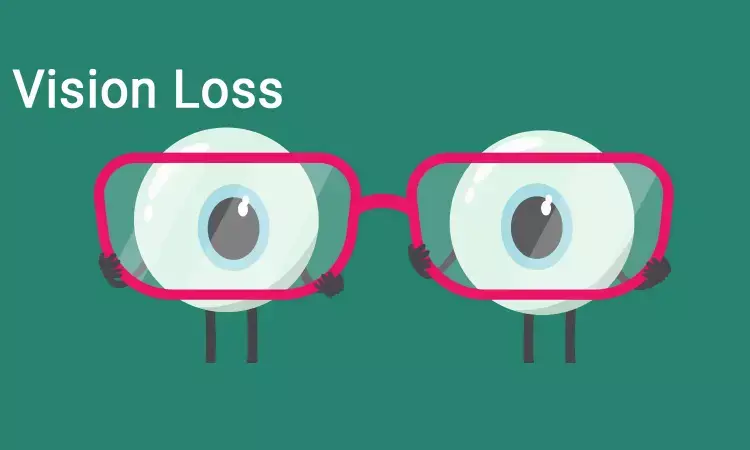- Home
- Medical news & Guidelines
- Anesthesiology
- Cardiology and CTVS
- Critical Care
- Dentistry
- Dermatology
- Diabetes and Endocrinology
- ENT
- Gastroenterology
- Medicine
- Nephrology
- Neurology
- Obstretics-Gynaecology
- Oncology
- Ophthalmology
- Orthopaedics
- Pediatrics-Neonatology
- Psychiatry
- Pulmonology
- Radiology
- Surgery
- Urology
- Laboratory Medicine
- Diet
- Nursing
- Paramedical
- Physiotherapy
- Health news
- Fact Check
- Bone Health Fact Check
- Brain Health Fact Check
- Cancer Related Fact Check
- Child Care Fact Check
- Dental and oral health fact check
- Diabetes and metabolic health fact check
- Diet and Nutrition Fact Check
- Eye and ENT Care Fact Check
- Fitness fact check
- Gut health fact check
- Heart health fact check
- Kidney health fact check
- Medical education fact check
- Men's health fact check
- Respiratory fact check
- Skin and hair care fact check
- Vaccine and Immunization fact check
- Women's health fact check
- AYUSH
- State News
- Andaman and Nicobar Islands
- Andhra Pradesh
- Arunachal Pradesh
- Assam
- Bihar
- Chandigarh
- Chattisgarh
- Dadra and Nagar Haveli
- Daman and Diu
- Delhi
- Goa
- Gujarat
- Haryana
- Himachal Pradesh
- Jammu & Kashmir
- Jharkhand
- Karnataka
- Kerala
- Ladakh
- Lakshadweep
- Madhya Pradesh
- Maharashtra
- Manipur
- Meghalaya
- Mizoram
- Nagaland
- Odisha
- Puducherry
- Punjab
- Rajasthan
- Sikkim
- Tamil Nadu
- Telangana
- Tripura
- Uttar Pradesh
- Uttrakhand
- West Bengal
- Medical Education
- Industry
Common HIV drugs may prevent leading cause of vision loss, study finds

Scientists have identified a group of drugs that may help stop a leading cause of vision loss after making an unexpected discovery that overturns a fundamental belief about DNA.
The drugs, known as Nucleoside Reverse Transcriptase Inhibitors, or NRTIs, are commonly used to treat HIV. The new discovery suggests that they may be useful against dry macular degeneration as well, even though a virus does not cause that sight-stealing condition.
A review of four different health insurance databases suggests that people taking these drugs have significantly reduced risk of developing dry macular degeneration, a condition that affects millions of Americans.
"We are extremely excited that the reduced risk was reproduced in all the databases, each with millions of patients," said Jayakrishna Ambati, MD, a top macular degeneration researcher at the University of Virginia School of Medicine. "This finding provides real hope in developing the first treatment for this blinding disease."
Targeting Macular Degeneration
The new discovery comes from Ambati; Fred H. Gage, PhD, of the Salk Institute for Biological Studies; and collaborators around the world. The work rewrites our understanding of DNA, revealing for the first time that it can be manufactured in the cytoplasm of our cells, outside the cell nucleus that is home to our genetic material.
The buildup of a certain type of DNA in the cytoplasm, Alu, contributes to macular degeneration, the researchers found. This buildup appears to kill off an important layer of cells that nourishes the retina's visual cells.
Based on this discovery, the researchers decided to look at drugs that block the production of this DNA, to see if they might help prevent vision loss. They analyzed multiple U.S. health insurance databases - encompassing more than 100 million patients over two decades - and found that people taking NRTIs were almost 40% less likely to develop dry macular degeneration.
The researchers are urging further study to determine if these drugs or safer derivatives known as Kamuvudines, both of which block a key inflammatory pathway, could help prevent vision loss from dry macular degeneration.
"A clinical trial of these inflammasome-inhibiting drugs is now warranted," said Ambati, the founding director of UVA's Center for Advanced Vision Science. "It's also fascinating how uncovering the intricate biology of genetics and combining it with big data archeology can propel insights into new medicines."
Ambati, of UVA's Department of Ophthalmology, previously determined that NRTIs may help prevent diabetes as well.
Hina Zahid Joined Medical Dialogue in 2017 with a passion to work as a Reporter. She coordinates with various national and international journals and association and covers all the stories related to Medical guidelines, Medical Journals, rare medical surgeries as well as all the updates in the medical field. Email: editorial@medicaldialogues.in. Contact no. 011-43720751
Dr Kamal Kant Kohli-MBBS, DTCD- a chest specialist with more than 30 years of practice and a flair for writing clinical articles, Dr Kamal Kant Kohli joined Medical Dialogues as a Chief Editor of Medical News. Besides writing articles, as an editor, he proofreads and verifies all the medical content published on Medical Dialogues including those coming from journals, studies,medical conferences,guidelines etc. Email: drkohli@medicaldialogues.in. Contact no. 011-43720751


